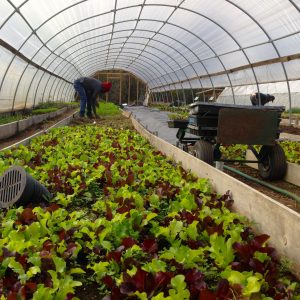
 Every month, Brown Paper Tickets donates a portion of our profits to a charity suggested through this page. We receive hundreds of submissions from inspiring, heart-string-tugging outfits across the world and I am lucky to be part of the selection process.
Every month, Brown Paper Tickets donates a portion of our profits to a charity suggested through this page. We receive hundreds of submissions from inspiring, heart-string-tugging outfits across the world and I am lucky to be part of the selection process.
This past month, we chose ECO City Farms of Prince George’s County, Maryland. We admire their work and love their cause. Boasting an inter-generational and diverse board, they are community and solutions driven. The organization works hard to solve problems facing low-income areas that have limited access to fresh food. ECO City promotes healthy farming, land restoration, empowerment, and is expanding their program. With a focus on food justice and environmental advocacy, they educate folks in farming to create sustainable small-scale food systems. This has a direct impact on clean produce accessibility.
They have created Urban Farm Models, Farm to School, Intern and Student Programs, a Foodshed Resource Center, all that teach people how to grow food to sell and feed themselves.
I am in love with ECO City and urge you to jump on board this donation train. If you feel inclined, donate here to support upcoming Urban Farming Projects. Here’s new terminology I learned while getting to know ECO City.
Food Justice Terminology
Food Desert: The USDA maps food deserts based on factors of access to fresh fruits and vegetables at local stores, access to transportation, low income and poverty rates, and urban/rural status. Take a look at the data.
Foodshed: A region that generates food for a local population. Food is grown, moved, sometimes sold, and consumed within the geographic region. ECO City works in Chesapeake foodshed.
Hoophouse: ECO City utilizes Hoophouses. They are similar to greenhouses but covered with plastic, which makes them lightweight, flexible, and less expensive to build. Hoophouses allow ECO City to grow produce year-round.
Certified Naturally Grown: ECO City is Certified Naturally Grown , a system used by “tens of thousands of farmers worldwide. These programs minimize paperwork and certification fees and employ a peer-inspection process built on local networks. They’re typically a better fit for small-scale producers who sell locally,” according to ECO City Farm’s website.


 Arts
Arts Comedy
Comedy Event Tips
Event Tips Film
Film Food & Drink
Food & Drink Good Causes
Good Causes Music
Music News
News Radio
Radio Roller Derby
Roller Derby